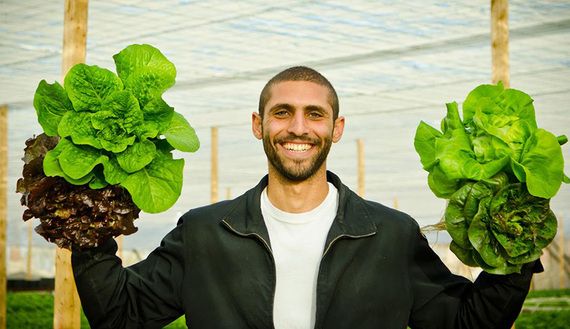Hydroponic Farming Finds Its Way to Egypt
Published on by Water Network Research, Official research team of The Water Network in Business
As Egypt's agriculture is threatened by water scarcity, Amr Bassiouny decided to think outside the box in the hope of finding a way out of this predicament and boosting the agricultural industry in general.

After a period of intensive self-study of farming systems, Bassiouny, with the help of his partner Adel El Shentenawy, founded one of Egypt's first hydroponic farms — Egyptian Hydrofarms.
Egyptian Hydrofarms became a boon for those who look for affordable healthy and pesticide-free leafy greens. Al-Monitor spoke to Bassiouny to get more details about his farm and the greens he grows hydroponically.
Hydroponics is a farming method that depends entirely on water instead of soil to grow plants. Plants can get the required mineral nutrients directly from the pH-balanced water. Such farming systems are environmentally friendly, do not use chemical pesticides and above all save approximately 95% of the water wasted in traditional farming.
Bassiouny, who studied business at Hong Kong University, told Al-Monitor, "I spent around nine months studying agriculture techniques on my own. Then I built a home hydroponics system and conducted several experiments. After successful trials, I insisted on spreading the idea and having my own farm."
Being fully convinced of this idea, Bassiouny dedicated all his time to establish and develop his farm, leaving his job in the business sector. In cooperation with co-founder Shentenawy, Bassiouny started a hydroponic farm producing leafy greens in January 2013. The farm is located along the Cairo-Alex Desert Road and opens its doors to all consumers and students who visit it.
In Egyptian Hydrofarms, seeds are placed in pots to freely grow. The nutrient-rich water is pumped through pipes. "We adopt the nutrient film technique. It is a hydroponic system by which the necessary dissolved nutrients are delivered to the plants' bare roots through gullies or channels. Under this system, we became able to grow a wide range of leafy greens in the same greenhouse,” Bassiouny said.
Lettuce and herbs in general are cool-weather crops, so they flourish in winter and spring. In the summer, these leafy crops grow hydroponically in Egyptian Hydrofarms’ greenhouses.
Before founding Egyptian Hydrofarms, Bassiouny started up a project called Desert School, which seeks to promote tourism in the Sinai Peninsula. Later he decided to establish the hydroponic farm to give the country's agriculture an extra boost.
"The future is for hydroponics. At first, I thought of establishing the farm in Sinai, but I changed my mind. The hydroponic system can be applied at any place. Hence, I look for lands that are not suitable for farming to make the best use of them," he said.
Traditional farming relies on water and soil. In Egypt, water sources are either polluted due to the drainage water being pumped into the Nile or highly salted. The soil also gives rise to insects and, therefore, farmers resort to chemical pesticides to get rid of them. This negatively affects food safety. All these factors along with the threats of global warming put traditional farming at stake, Bassiouny said.
"Under these deplorable conditions, people won’t find anything to eat by 2050 and the Nile water won't be enough for irrigation. For this very reason, I was implored to introduce hydroponic techniques, which save more water and its products are of higher quality and larger quantity," he said.
Read more: Al-Monitor
Media
Taxonomy
- Agriculture
- Hydroponics
- Soil
- Irrigation
- Water Scarcity
- Water Scarcity In Desert area
- Consumption
- Farms